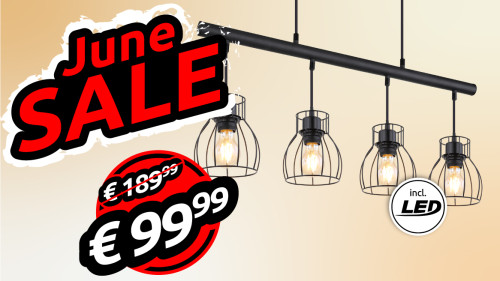BEDROOM LAMPS & LIGHTS
Bedroom Lamps
At Globo Lighting you will find the right lighting for your bedroom. Here we explain what you should look out for when choosing your bedroom lamps.
Tips for choosing bedroom lighting
The following recommendations will help you choose the optimal bedroom lighting:
- The size and layout of the room determine how many light sources are needed.
- When planning bedroom lighting, be aware of the available power connections and sockets in the room. Alternatively, battery-operated lamps can be placed in addition.
- Different types of bedroom lamps in different heights and positions provide cosy light.
- Make sure that different light colours can be used depending on the time of day. LEDs with a choice of colour temperature are ideal for illuminating the bedroom.
Bedroom Lighting Features
The bedroom is a multifunctional room in which a feel-good atmosphere and pleasant lighting are the most important. In addition to restful sleep, the bedroom also serves as a dressing room and a reading room. Depending on the area, different lighting is required. All of this should be taken into account when choosing the right lighting.
The basic lighting in the bedroom
The basic lighting in the bedroom forms the basis of the lighting concept and provides illumination of the room in the area. Ceiling lighting usually takes over this task. LED panels or recessed spotlights, for example, are suitable for this. For higher ceilings, a chandelier, a pendant or pendant lamp and a pendant lamp can also provide pleasant light in the bedroom.
Various functional areas and islands of light in the bedroom
Fall asleep and wake up
In addition to a comfortable bed, the right lighting also provides cosiness in the bedroom. A distinction must be made here: a different light is needed before sleep than after waking up. The reason: to fall asleep, the body needs rest and produces the sleep hormone melatonin. To support this, a warm white light with a larger red component is best. On the other hand, cool white light with a higher blue content is well suited for waking up. Of course, daylight is ideal for starting the day.
To meet these requirements, bedside lamps or wall lights near the bed, for example, are suitable, which are equipped with an appropriate light source such as LEDs. If these have a dimmer, they can be regulated according to the time of day.
Reading: the bedside lamp
Many people read in bed before sleeping. This ensures relaxation and promotes sleep. The prerequisite is the right lighting in the form of suitable bedside lamps. Models should be chosen that do not dazzle and emit the right light colour. Here, too, dimmable lamps that can be adjusted to individual needs are particularly suitable.
Dressing: bedroom lamps for wardrobe and mirror
Often the bedroom is the room in which the wardrobe is located and in which you dress or undress. Many wardrobes have a large mirror for this purpose. The right lighting is also needed for choosing clothes in the closet and looking in the mirror after dressing. There are various options here. Above all, good illumination without shadows is important. Recessed lighting in the cabinet, spotlights or spotlights mounted on the ceiling or cabinet are a good solution. Care must be taken to ensure sufficient distance so that shadows are not cast. For additional illumination, wall lamps placed near the wardrobe can serve this purpose, as they emit light from the side.
Special mirror lights are used to illuminate wall mirrors or make-up mirrors. Here it is important that they do not dazzle.
Indirect light as a supplement
Indirect light is also particularly suitable for the evening and as mood lighting, which can also contribute to relaxation and thus to recovery and to the promotion of healthy sleep. Under-cabinet lights, which are available as LED strips, for example, are particularly suitable for this purpose. They can be placed under shelves, cupboards or under the bed and create a cosy atmosphere. Battery-operated LED strips are ideal for particularly easy installation.
Which lamps fit best in the bedroom?
Choosing the right lamps for the bedroom is first and foremost a matter of personal taste. If you follow the basic recommendations for light intensity, placement and light colour, there are no limits to the choice of bedroom lights. A combination of ceiling lamps, table lamps and lamps on the wall leaves plenty of room for creativity. The decision can also be based on the style of the bedroom furnishings - for example, there are matching lamps in country house style, industrial design or rustic. A style mix of old and new is also popular. Materials such as aluminium, wood, plastic or glass provide an elegant, modern, rustic, or cosy room light.
Which LED lamps are suitable for the bedroom?
Basically, most LEDs are suitable for the bedroom as:
- They are energy-efficient and economical
- They are available in many different variants, light intensities and light colours
- Many LEDs are dimmable and also have the option of choosing the light colour.
Therefore, use LEDs that meet the above-mentioned requirements for light intensity and light colour and are compatible with your lights.
How many lamps do you need for the bedroom?
The number of lamps needed in the bedroom depends on the size and layout of the room, the different functional areas and, of course, the type of bedroom lamps that will be installed. We recommend 100 to 140 lumens per square meter in the bedroom. So your bedroom is bright enough to read, dim enough for a deep sleep.
Light intensity and light colour
When it comes to the right light colour for the bedroom, a distinction must be made between ceiling lighting and additional light sources such as bedside lamps. For a ceiling light, warm white to neutral white light with 3,000 to 4,000 Kelvin is ideal.
Especially in the dark season, daylight white light of around 6,000 Kelvin in the morning is well suited to get going. In the evening, on the other hand, a warmer light of around 3,000 Kelvin should be used. There are various lamps and bulbs where the color temperature can be changed. This is also referred to as "Tunable White".
For bedside lamps, on the other hand, warm white light with 2,700 to 3,000 Kelvin is pleasant. Pay attention to the information on the lamp or bulb.
Our tip: many LEDs now offer the option of choosing the light colour. This will give you the most comfortable lighting depending on your needs. In our "Bulbs" category, we offer you the right LEDs for bedrooms and other rooms. Also note that the colour of the lampshade also influences the lighting.
How many watts should bedroom lighting have?
The optimal wattage for the bedroom is calculated from the required number of lumens and the power consumption of the selected bulbs. The decisive factor is the luminous efficacy: it indicates how much energy must be used for a certain luminous flux.
Example: an incandescent bulb produces a luminous flux of about 12 lumens per watt. With a LED, on the other hand, it is 180 lumens per watt. To generate 2,500 lumens in the bedroom room, about 200 watts are needed when incandescent lamps are used. When using LEDs, on the other hand, it is around 14 watts.
Which light does not interfere with sleeping?
Studies show that light with a high blue content can suppress the formation of the sleep hormone melatonin and lead to delayed fatigue. This applies, for example, to people who use their cell phones or watch TV before sleeping.
The lighting in the bedroom should correspond to these findings: in the evening, light with a low blue content and a higher red component is the most favourable, while in the morning a higher blue content supports waking up.
Buy bedroom lamps from Globo Lighting
In our assortment you will find bedroom lamps for every taste. If you have any questions about our bedroom lamps, we are happy to help you by phone. You can find our telephone number and service hours on our contact page.






































Newsletter
Contact
Contact us